SIMPLE MACHINES
| Machines are tools that help us do our work. Machines make our jobs easier and faster. What comes to your mind when you think of a machine? Washing machine, sewing machine, dish washer, vacuum cleaner, and lawn mower? Yes these are all machines. They are complex machines made up of many parts. But there are also simpler machines. We have been using them for a long time. Look around your surroundings carefully. Knives, scissors, hammers, screw drivers, nut crackers, wheels, etc. are all simple machines. You will find examples of simple machines everywhere. Complex machines are made up of a combination of these simple machines. There are mainly five different types of simple machines. 1)Lever 2) Inclined plane 3) Screw 4)Wheel and Axle 5) Pulleys Let us look at each one of them one by one. | ||
| Lever - With the help of a lever you can lift a heavy weight with much less effort. A lever consists of a rod, which balances on a fixed point. The heavy object that has to be moved or lifted is called the “Load” Depending on the position of the effort, load and fulcrum, the levers are grouped into three different types. First class levers- The fulcrum is placed between the effort and the load. | ||
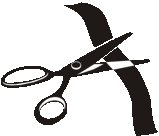 | 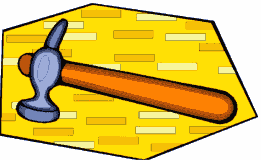 | 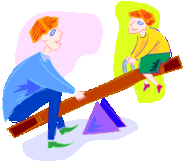 |
Second class levers- The fulcrum is placed on one end of the rod. Effort is applied on the other end and load is in between. Third class levers- The fulcrum is at one end, the load is at the other and effort is applied in the middle. | ||
 Inclined Plane: Any flat surface can be called a plane. A table top, surface of a book, sheet of paper, plank of wood etc. are all planes. Inclined Plane: Any flat surface can be called a plane. A table top, surface of a book, sheet of paper, plank of wood etc. are all planes. If you tilt and hold them at an angle they become Inclined Planes. This doesn’t look like a machine at all, does it?
| ||
| Try this: Take a marble and put it on a flat surface. Then push it from one end of the surface to another. Though it is easy to push, it does require some effort. Now incline the surface and put the marble on top. What do you see? Use some other objects to try the same experiment. |
| Thus, an inclined plane can be defined as a tool that helps us move heavy objects from a high place to low place and low place to high place. Inclined planes also move things quickly. Trucks are often loaded and unloaded with the help of inclined planes. Wheel chairs can be easily pushed up and down the inclined planes (ramps in buildings and hospitals). Roofs of houses are made to be inclined planes, so rain water will run off quickly and not leak in the house.
| ||
Screw: A screw is a pointed nail with grooves in it. This thread of grooves is actually an inclined plane. 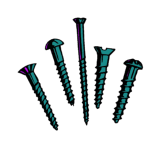 |
Try this-Cut a triangular piece of paper. |
Try this: When you travel you fill your suitcases. Lift a fully loaded suitcase. Try carrying the suitcase around. Your hand starts hurting after a while. Try dragging it around. It would be very difficult and inconvenient. Now put some wheels under it. Put it on a trolley or wagon and pull it around. |
Wheels and axles are used to carry loads around easily, for long distances with very less effort. When wagon wheels are mounted on axles, at the center of the wheel is a bearing which turns on the axle. The inside surface of the bearing is made smooth to make the turning of the wheel around the axle easy with very little friction. Not only that, the bearing is also oiled (lubricated) to make it slippery. This reduces the friction even more and the wheel can turn faster. It is hard to imagine our life without wheels and axles. If we look around us we can see them every where. Most complex machines have wheels in them to turn other parts. For example : Clocks, Mixers and Grinders, Vacuum cleaners, sewing machines, fans etc. Machines like cars, trucks, trains etc move on the wheels and axles. | ||
Try this: Hold one end of a rope in your hand and throw other end down from a height. Tie a heavy load to the other end and try pulling it up by pulling the rope. It will take a lot of effort to pull the load up. But if the rope is passed through a pulley, it would be easier to lift the load. A pulley makes our work easy by changing the direction of the force applied. Instead of pulling the load up you are now pulling the rope downwards. It is always easy to pull down than to pull up. Such simple pulleys (one wheel and rope) have been used for a long time to pull water from the wells, hoist a flag or on construction sites. Such pulleys are used in factories, construction site, docks, and wherever there is a need to lift .
| ||
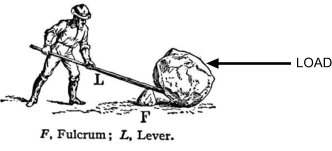
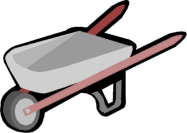

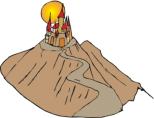
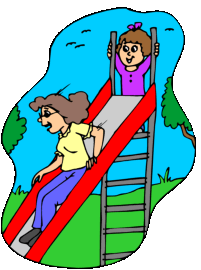 Steep and winding mountain roads, highway ramps, slides on the playground, are all inclined planes.
Steep and winding mountain roads, highway ramps, slides on the playground, are all inclined planes. 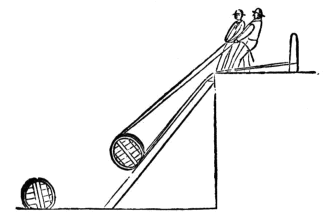 Even ancient Egyptians had used inclined planes, to lift heavy stones while building pyramids.
Even ancient Egyptians had used inclined planes, to lift heavy stones while building pyramids.  With the help of a marker or crayon color the inclined edge of the triangle. Take a pencil. Then wrap this triangular piece of paper (starting from the broad end and going towards the pointed end) around the pencil.
With the help of a marker or crayon color the inclined edge of the triangle. Take a pencil. Then wrap this triangular piece of paper (starting from the broad end and going towards the pointed end) around the pencil. 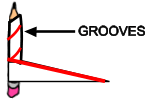 The inclined edge will now look like grooves in a screw.
The inclined edge will now look like grooves in a screw.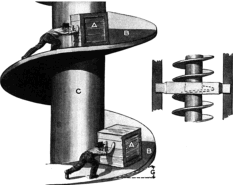 How is a screw a simple machine? It makes our job easy and more efficient. If a nail has to be hammered into wood it needs a lot of force. A screw has a groove on its head for a screw driver.
How is a screw a simple machine? It makes our job easy and more efficient. If a nail has to be hammered into wood it needs a lot of force. A screw has a groove on its head for a screw driver. 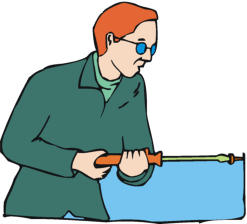 If a screw is held against a piece of wood, and its head is turned around with the help of a screw driver, it easily moves inside the wood because of its inclined edge.
If a screw is held against a piece of wood, and its head is turned around with the help of a screw driver, it easily moves inside the wood because of its inclined edge. 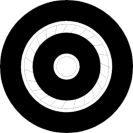 in the center it is called an “axle”.
in the center it is called an “axle”. 
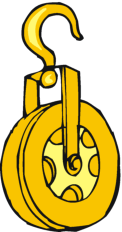
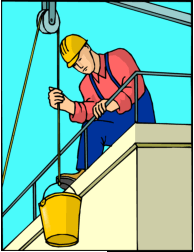
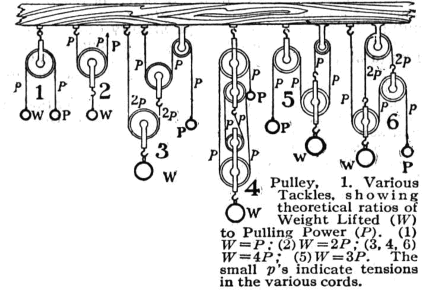
1 comentario
Alba 6ºC -
SEE YOU TOMORROW AT SCHOOL.
ALBA 6ºC.